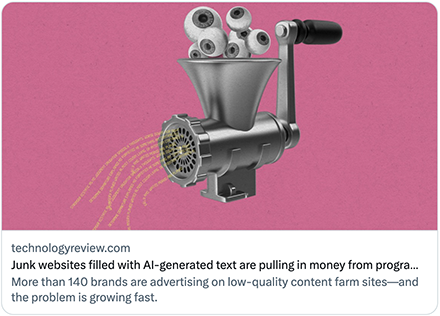 |
||||||||||
|
||||||||||
| Have Big Tech's Privacy Updates Sent The Open Marketplace Into FreeFall? |
| In one corner, we have two tech giants releasing privacy edicts, and in the other, the advertising and digital media industry that has to deal with the fallout. In July, Apple and Google are both expected to launch privacy updates when they introduce new versions of their platforms. Apple IOS 17: Apple’s new update expands to public beta this month before the official kickstart in September. The update automatically removes trackers from URls sent from Messages, Mail, and Safari Private Browsing. Google Chrome: Google’s privacy journey continues with a rollout of APIs for Chrome and the jumpstart of the 18th-month road to the Privacy Sandbox. After these announcements, marketers scrambled to find solutions as a long-held targeting tactic slipped from their grasp. They knew these days were ahead, but planning for something and experiencing it are two different beasts. It’s still unclear how both updates will impact advertising over the next few months, but publishers and advertisers are closely monitoring how they will impact their business. |
| The end goal for both companies is to protect consumer privacy, but many critics wonder if their privacy pushes are also strategies to strengthen their walled gardens. “The upcoming privacy updates in Chrome and Safari remind us that hyper-targeting and tracking consumers is not the future of advertising, and prioritizing their privacy is non-negotiable,” said Morika Georgieva, Director of Customer Success & Technical Services at Permutive. The advertising ecosystem fears that some of these privacy updates, specifically removing URL parameters, could make campaign analytics less reliable. There is also some concern about the unintended consequences of the updates. Collateral Damage: Publishers and advertisers believe the updates could hinder URL trackers related to ad measurement, embedded media, social widgets, fraud prevention, bot detection, audience measurement, and funding websites that rely on targeted or personalized ads. "Between cookies being deprecated and privacy solutions accelerating, the measurement and analytics provided by Apple and Google are not yet comprehensive enough to provide an understanding of the return of our marketing efforts without additional measures," said Michael Monaco, SVP of Marketing Analytics & Insights at Kepler. "For advertisers that continue to rely on user-centric measurement, this is just one of a thousand cuts already deployed that will make measurement difficult." Addressability and Targeting Issues: According to Georgieva, choosing cookieless browsers and opting out of tracking on Chrome, has already reduced addressability to 30%. Publishers and advertisers can no longer rely on IDs to reach audiences and measure performance, the result is publisher open marketplace (OMP) revenue is in freefall, and brands are losing market share. Some ad tech professionals saw the rumblings coming. The hashed email’s first-party data capabilities were helpful at a time before privacy concerns wreaked havoc on the ad tech industry targeting practices, but we're in a new age. "Apple and other tech companies are pioneering new features that may turn email into a Schrödinger-esque mind game where email addresses are unilaterally purpose-limited by the consumer," wrote Myles Younger, Head of Innovation and Insights at U of Digital. "where the email record held by a brand or a publisher (or a walled garden) is little more than a pointer to somewhere…or to nowhere." It may be frustrating for ad and rev ops professionals who have to deal with surprising changes around every corner — the ad tech labyrinth gets more complicated by the day — but change is not new for the industry. Consumers want these changes, and their needs should always come first. |
|
| AI + Ad Tech = Don’t Believe the Hype? |
| There’s a lot of hype around AI in Adland, and those who attended the Cannes International Festival of Creativity definitely got an earful. As Vova Kyrychenko, CTO, Xenoss points out: “From all sides of ad tech – DSPs, SSPs, CMPs, fraud prevention tools – I am seeing swaths of vendors rebranding their products/tech as “something-AI” and pushing machine learning, previously kept in the background, to be front and center of the product.” AI is now used as a catchall for everything within machine learning and data science to give it the gloss of ad tech’s shiny new thing. Since the breakout of ChatGPT, ad tech has become a panoply of AI everything, but we all know that AI and ML have integrated into ad tech over the years. All the walled gardens (and independent programmatic platforms) use a degree of algorithmic alchemy to optimize ad campaigns. Now they are all jumping on the bandwagon to integrate generative AI into their ad tools. For example, Google’s Marketing Live is set to change the face of campaign management and creation. Campaigns will be generated automatically, customizing assets to target specific audiences and reach campaign goals — without the aid of writers and designers. As well, bidding and targeting can adjust in real time. Other examples include WPP teaming up with Nvidia to develop a content engine for creatives. Chat GPT also has huge potential for streamlining ad ops. At AdMonsters Publisher Forum, Coronado Island, Jared Collett, Sr. Director, Ad Operations at Major League Fishing, plans to showcase the transformative potential of ChatGPT, empowering ad ops professionals to streamline tasks, enhance efficiency, and drive better outcomes. The good news is that Google says AI-drive campaigns achieve 18% higher conversions, and IBM’s personalized AI-driven creatives saw CTRs rise above 113%, with effectiveness increasing by 120%. There’s no question that AI can bring efficiency to ad tech. But at what cost? |
| While all the hype might be somewhat merited, there are some caveats to AI’s rise in ad tech. We have reported on the data privacy implications of the tech, as well as the need for regulation. There’s also the question of cost. Big tech has the cash to race ahead with AI implementation into their products, but independent ad tech companies that are plugging AI into their platforms will begin to see their maintenance costs skyrocket. The talent and computing power necessary to run these AI projects will be major. And let’s not forget the potential for AI to add more latency to an already complicated programmatic process. The AI train has already taken off, and there’s no stopping it now, but just because you can build something doesn’t mean you should. Consider how your AI project will impact the entire ad tech ecosystem and your overall business goals (as well as consumers). And for those worrying about AI taking over our jobs, remember that human input is still needed. Just maybe, it’s time for everyone to acquire some new skills. |
| Around the Water Cooler |
 |
| OpenAI Disables 'Browse with Bing' Beta over Paywall Concerns OpenAI has disabled the "Browse with Bing" feature in its GPT-3 powered language model, citing concerns over paywall circumvention. OpenAI admits this phase of the tech was for beta testing, and they promise to fix the issues. (MediaPost) EU Gives Thumbs Up to EU-U.S. Data Flow After the death of the Privacy Shield and three long years of legal limbo, the European Commission adopted an adequacy decision, accepting the U.S. as a country with sufficient protection to receive Europeans’ personal data. The new deal, known as EU-U.S. Data Privacy Framework, “revives transatlantic exchanges underpinning billions' worth of digital trade.” NOYB plans to challenge the decision, noting that it’s merely a copy-paste of Privacy Shield. (Politico) IAB Tech Lab Announces Stable Release of OPJA Spec and DCR Guidance It’s time for interoperability to come to Data Clean Rooms with the announcement of the IAB Tech Lab’s first stable release of the OPJA specification and DCR Guidance and Recommended Practices. Now, DCR Providers can start building products and features using this interoperability standard for activating private audiences. (iab Tech Lab) Judge Rules Biden Administration Likely Trampled on Free Speech on Social Media In a recent ruling, a judge has determined that the Biden administration may have infringed upon free speech rights on social media platforms. The decision highlights concerns over government interference and raises questions about the extent of permissible regulation in the digital realm. (Wall Street Journal) Threads, Meta's Messaging App, Faces Delay in EU Launch Facebook's messaging app, Threads, is experiencing a setback as its launch in the European Union (EU) faces a delay. Experts attribute the delay to regulatory concerns and compliance issues, tech companies' challenge navigating regional regulations and enforcing data privacy and protection. (Tech Crunch) |
 |
||||||
|
||||||
 |
||||||
|
||||||
 |
||||||
|
||||||








